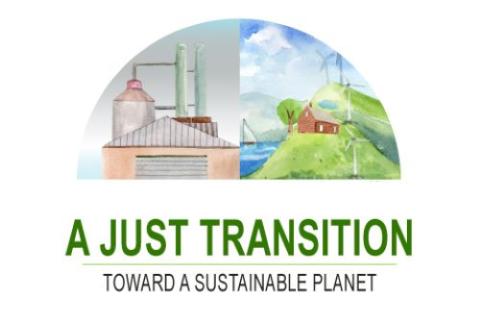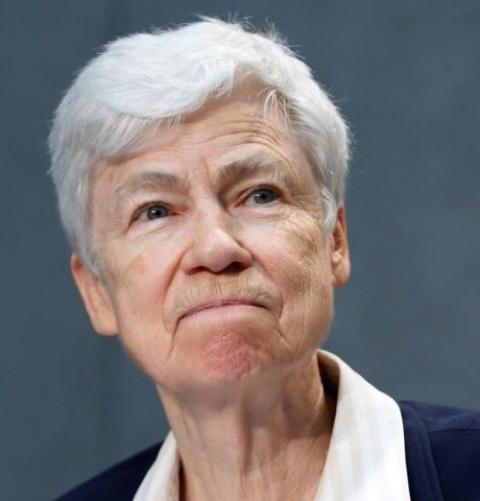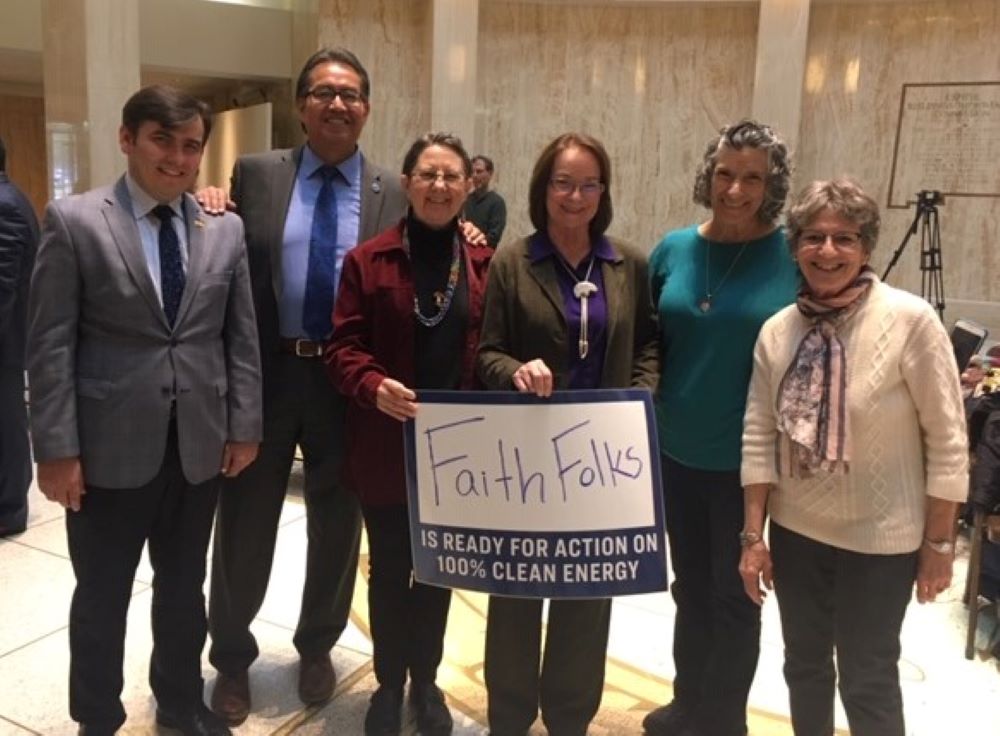A dump truck hauls coal and sediment near Rock Springs, Wyoming, in 2017. Mining is one of many examples of the destruction of natural resources. (CNS/Reuters/Jim Urquhart)
Editor's note: The phrase "just transition" is part of the growing lexicon about moving from an economy based on fossil fuels to clean energy. But this phrase's meaning varies. The term can also mean the need for a just transition to new jobs for those employed in industries such as mining. Catholic sisters are involved along the spectrum of transition efforts.
Global Sisters Report presents this series as world leaders, climate experts and activists gather in Glasgow, Scotland, for the United Nations Climate Change Conference, or COP26. The Oct. 31-Nov. 12 conference is expected to establish new international targets for reducing harmful emissions caused by fossil fuels.
Around the world, communities are mobilizing to protect their valued natural resources from international corporations that want to strip the land for profit. This work toward a more sustainable planet stretches from rural areas in the Philippines to the halls of the United Nations.

Columban Sr. Anne Carbon witnessed this work firsthand between 1997 and 2000, when she lived in the Zamboanga province in the southern Philippines and worked with the Indigenous Subaanen people to keep out a company that wanted to drill on their land. Previous illegal logging in the community had uprooted small farmers and stripped the rich biodiversity of the forest.
"Thousands of trees, medicinal plants were affected and these caused hunger and the death of children," she told Global Sisters Report in a recent email. "If mining would go ahead, this would push people to evacuate from their homes, and open pit mining would pollute the air and their water sources."
With the help of prominent allies like the local archdiocese, the Missionary Sisters of St. Columban and the Columban Society, the Indigenous group has organized ongoing legal action, picket lines and hunger strikes against the proposed mining operation since 1997.

Columban Sr. Anne Carbon (Courtesy of Anne Carbon)
Opposing corporations' profit-driven models and finding viable options to preserve the Earth's resources is not and will not be easy. But activists working on a just transition to a sustainable planet through actions to fight climate change and to move workers away from jobs that contribute to greenhouse-gas emissions say the transition is moral, practical and imperative.
"A just transition is a vision to help us shift from an extractive-based economy to one that is just, equitable and regenerative," said Canadian Sr. Sheila Smith, who represents the Society of the Sacred Heart at the United Nations. "How we make this shift is deeply influenced by a belief that just transition happens by transforming how we see ourselves as humans in relationship with others in Earth community."
As with any big idea that has wide implications, the concept of a just transition has more than one meaning.
"Just Transition is a vision-led, unifying and place-based set of principles, processes, and practices that build economic and political power to shift from an extractive economy to a regenerative economy," the Washington-based advocacy group Climate Justice Alliance says on its website, calling the concept "a principle, a process and a practice."
A banner protests fuel drilling in Zamboanga province in the Philippines in 2013. (Courtesy of Anne Carbon)
"This means approaching production and consumption cycles holistically and waste-free," the alliance says. "The transition itself must be just and equitable; redressing past harms and creating new relationships of power for the future through reparations. If the process of transition is not just, the outcome will never be. Just Transition describes both where we are going and how we get there."
Put another way, it's a "transition from the linear economy to more of a circular economy, where you're really looking at reusing and recycling, refurbishing, repairing so that what we use is sufficient for us but is not detrimental to the next generation," said Sr. Sheila Kinsey, who heads the Sowing Hope for the Planet campaign for the International Union of Superiors General, the global organization representing the majority of the world's 600,000 sisters.
"It takes into the whole picture of all of creation, that relationships are in right order, and they're very respectful," said Kinsey, a member of the Franciscan Sisters, Daughters of the Sacred Hearts of Jesus and Mary.
The urgency is real. As the U.N. Environment Program points out, "The concentration of greenhouse gases in the earth's atmosphere is directly linked to the average global temperature on Earth." That concentration — and resulting temperatures — have been rising since the Industrial Revolution in the 1800s.

Sr. Sheila Kinsey is co-secretary of the Justice, Peace and Integrity of Creation Commission of the International Union of Superiors General. (CNS/Paul Haring)
"The most abundant greenhouse gas, accounting for about two-thirds of greenhouse gases, carbon dioxide (CO2), is largely the product of burning fossil fuels," the U.N. Environment Program says.
Stephen Schneck, the executive director of the Franciscan Action Network, a Washington-based advocacy group, said the transition is an example "of both/and": heeding the current global environmental crisis while being attentive "to the cry of the poor."
That is a considerable challenge, he said, given "existing economic structures, existing power relations and the distribution of wealth in the world right now."
Examples of the destruction of natural resources are truly global: mining and clearcutting of forest; overfishing in the world's oceans; the domination of the lumber industry in large areas in Southeast Asia and the Amazon Basin; the trend toward monocultural agriculture, uprooting small farmers everywhere.
"These are all challenging, daunting problems," he said.
Sr. Teresa Kotturan, the U.N. representative for the Sisters of Charity Federation, said the problems can seem overwhelming: "On climate change alone, where do you begin?"
She noted that the problem involves so many sectors of society that nongovernmental advocacy groups at the U.N. have yet to form a dedicated group on climate change, much less on just transition, though she added that Catholic religious congregations that work at the United Nations work together on advocacy efforts through the framework of Pope Francis' landmark encyclical "Laudato Si', on Care for Our Common Home" and the church's Laudato Si' Action Platform.
"We are concerned. Congregations must be concerned if we take seriously the idea of nobody being left behind," Kotturan said.
While the challenges are global in scale, problems are inherently local, she said.
For example, "what's the effect of a solar farm on a rural area? Will people be displaced?" she said. "Local people must be involved in any decision regarding a just transition."
"Congregations must be concerned if we take seriously the idea of nobody being left behind."
— Sr. Teresa Kotturan, U.N. representative for the Sisters of Charity Federation
The role of labor and gender in a just transition
The idea of a just transition also has roots in the labor community and touches on broader issues, such as gender equality.
"The idea of just transition has been shaped by union efforts to protect their members from the loss of jobs that pay better without attention to what kinds of work will be available to those workers when those jobs go away," said historian Joseph McCartin, who teaches at Georgetown University and is executive director of the school's Kalmanovitz Initiative for Labor and the Working Poor, a center for labor education, research and training.
"A just transition is one that does not lower workers' standards of living, exacerbate existing inequalities or further concentrate power and wealth," McCartin told GSR. "It is a transition that is both ecologically and socially sustainable."
McCartin noted that while the labor movement can be divided on climate issues because of a commitment to save jobs, it has been generally united around the idea of a just transition, though he acknowledged that whether the idea can be achieved in today's political climate is "another matter."
He acknowledged that communities in affected areas of extractive industries, like Appalachia in the United States, can be resistant to the idea of just transition and noted that such suspicion has a history.
"Such communities have usually endured long histories of exploitation," McCartin said. "Wherever such histories are deeply embedded, people tend to be suspicious that whatever they are now being promised will be as empty as the promises of past exploiters were. It takes actions, not promises, to persuade such people that something truly better is in store."
Advertisement
Kotturan said that in her congregation's home state of Kentucky, there has been a trend of moving people from extractive industry jobs to work in the state's prison facilities. While the new work is welcome, "that's not life-giving work" or a long-term solution, she added.
Even with those challenges, there are signs that the labor movement is warming to the idea of climate-related changes. About a decade ago, the U.S. United Auto Workers, or UAW, sided with automakers to resist raising fuel economy standards out of fear that such standards could cost union jobs, McCartin said. But now, he said, UAW urges employers "to go all in on electric vehicles and is hoping to organize electrical vehicle workers."
Despite some successes within the labor movement, some want the just transition movement to be clearer about wider commitments and concerns.
Beth Blissman, a lay representative for the Loretto Community at the United Nations, said while the idea of a just transition "sounds like something at the heart of what we've done at Loretto," she said she hopes the movement is vocal in championing the idea of a "feminist Green New Deal," which recognizes "women's time and labor, particularly unpaid labor" and affirms the role of women in climate-related solutions.
As it is, Blissman said, "just transition" is a "muscular term" that might not fully embrace the experiences of women.
Too often, she said, "women are first affected and last consulted" on many issues, but particularly on matters of economics and science, often seen as male domains.
Blissman is also concerned that the just transition movement risks being too fixated on technological solutions to solving the climate crisis and ushering in economic changes needed to create a more sustainable environment. A worldwide transition from fossil fuels to electric cars or wind- or solar-powered energy is only a piece of what needs to happen in a transformed world, she said.
"We need to address the issue of patriarchy, too," and the threat that patriarchal systems continue to have on women, including the lack of education for girls in many societies or violence against women and girls, she said.
"How 'just' is 'just transition'?" she said. "We need a just transition for everyone."
Despite these worries, advocates for a just transition say Laudato Si' helps their work seeking a wide vision of what constitutes a transition to a more sustainable global economic and social system.
"As Laudato Si' argues, environmental and social sustainability are deeply intertwined and interdependent," McCartin said. "Social exploitation and environmental degradation go hand in hand. Faith communities and worker organizations are naturally drawn toward this truth. Confronting climate change demands that they link arms in what is a struggle for the common good."
Protesters against the continued use of fossil fuel hold signs along a road in Mather, California, as President Joe Biden visits the area in September. (CNS/Reuters/Leah Mills)
Religious communities may offer a vision of working together
Kinsey is confident that a wider definition of "just transition" that is focused on both the important need for good jobs and long-term sustainability can prove successful if it is grounded in a holistic vision that incorporates religious faith.
Those working within religious traditions are often the ones who carry on work because they understand long-term implications, Kinsey said. Religious groups — women and male religious, laity in churches, the church hierarchy — are increasingly aware "that we're connected all up and down the spectrum."
"This is a new way, this new frontier we're accepting, really looking at accepting the prophetic call that we're being asked to bring forth in our church and in our world," Kinsey said.
Schneck underlined the need for a wider vision, noting that what ails the planet is rooted in spiritual crises — a turning-away of justice-based principles.
"It's a matter of the soul," he said. "We have to embrace a lifestyle of living in justice with the planet. It's a moral imperative: justice for the planet and justice for the poor."
What faith communities can awaken, he said, "is a moral and religious responsibility to act for justice. We can remind all sides that the demands of creation care aren't merely transactional, technical or interest driven. We can remind everyone that they are morally obligated to care for what God has created and still owns and to tend and safeguard it for a moral purpose."
The time for that is now, Schneck said, because the struggle "to address the planet's climate and ecological crisis is at an existential inflection point."
Faith communities and institutions are in a unique position to bridge many divisions, he added: "Divisions between labor and industry, rich and poor, the global north and the global south, and even between conservatives and progressives potentially can be mitigated via religious appeals."

Franciscan Sr. Joan Brown, third from left, and other representatives of New Mexico Interfaith Power & Light celebrate the passing of state energy transition legislation with state Sen. Mimi Stewart, fourth from left, at the state capitol in Santa Fe in 2019. (Courtesy of New Mexico Interfaith Power & Light)
As executive director of the environmental advocacy group New Mexico Interfaith Power & Light, Sr. Joan Brown knows firsthand the importance of bringing together different faith communities for a common cause.
Faith leaders in the Permian Basin region in southeast New Mexico and West Texas work with Brown's group to advocate for communities experiencing high levels of pollution, said Brown, a Sister of St. Francis of Rochester, Minnesota.
Brown said the Permian Basin is "a climate bomb right now. It's one of the highest-producing oil and gas regions in the world, so there's a lot of pollution."
And there are anxieties about how communities in the region will be able to transition to a place where they are able to balance the needs of both maintaining jobs and improving environmental conditions, she said.
There are concrete concerns to consider, too: More than a third of tax income for the state's schools come from the oil and gas industry, Brown said.
"That's something I don't think that is often thought of is the implications that trickle down in all kinds of ways. It's not just the worker; it's the grocery shop person, it's the education, it's the school district," she said. "Communities really need to be engaged in that."
"The communities there feel that they're a sacrificed zone and are continually a sacrificed zone," Brown said. "They're suffering from pollution now. Everybody else is using their energy. And yet with this transition, where are the jobs going to come from?"
These are challenging and daunting questions with no easy answers.
"These are all ethical, moral imperatives. How do you address this and weigh the larger global issues and the local and the people?" Brown asked.
"Our faith doesn't say we should sacrifice the few for the many, but we need to be thinking about the common good," she said. "I'm just not sure that we even in faith communities have grappled adequately with the complexities of our time in terms of these ethical moral issues."

Members of the Indigenous Subaanen community in Zamboanga province in the southern Philippines camped out for 24 hours in 2013 to prohibit further drilling for fuel in the area. The group, with help from the local archdiocese, the Missionary Sisters of St. Columban and the Columban Society, has organized ongoing legal action, picket lines and hunger strikes against the proposed mining operation since 1997. (Courtesy of Anne Carbon)




